#woden
Explore tagged Tumblr posts
Text
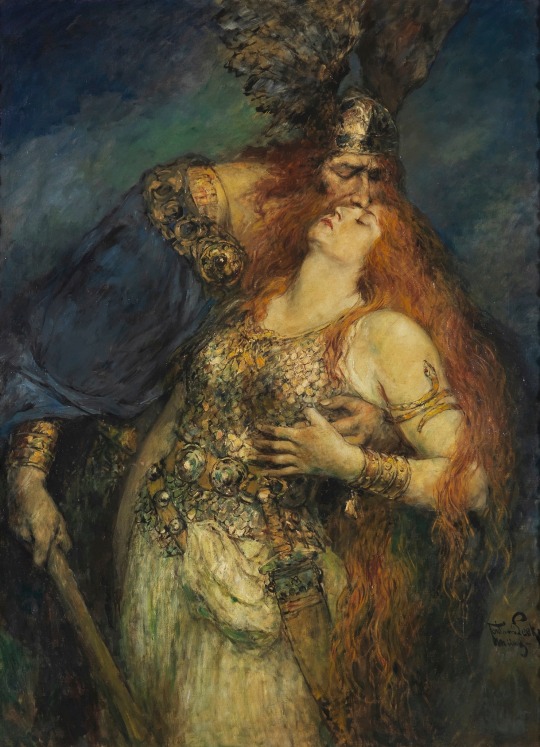
Wotan's farewell to Brunhilde by Ferdinand Leeke
#wotan#brunhilde#art#ferdinand leeke#die walküre#the valkyrie#richard wagner#odin#norse mythology#germanic mythology#der ring des nibelungen#the ring of the nibelung#mythology#religion#germanic#germany#german#nordic#norse#northern europe#europe#european#gods#mythological#woden
373 notes
·
View notes
Text

Source: VK.com
Artist: Sjors van Helmond [ArtStation]
Original posted 27th December, 2021
Created by Photoshop
"In this artwork, I wanted to display the mystery and wisdom associated with the All-Father of the Norse gods. The artwork features Odin with all his attributes, his ravens, his wolves, his spear, his drinking horn, his hat and his magic ring. The illustration also features various references to stories related to Odin like the three shields in the bottom. The first shield shows Odin sacrificing his eye to the well of Mimir for wisdom, the second shield depicts Sleipnir Odin's eight legged horse and the third shield shows how Odin and his two brothers carved the first two humans Ask and Embla out of wood."
Re-posted respecting finding the original on ArtStation.
#Odin#odhinn#rune#runes#odin art#rune art#norse gods#norse myths#odinn runes#rune designs#norse god#allfather#grimnir#wotan#woden
147 notes
·
View notes
Text

ODIN
© Milta Svartvis 2015
MORE LIKE THIS @miltaart
MY PHOTOGRAPHS @sonnemordundsterne
#artists on tumblr#odin allfather#odin#wotan#woden#wodan#allvater#allfather#norse mythology#norsemen#norse#norse paganism#heathen#asatru#pagan art#paganblr
77 notes
·
View notes
Text
The sacred space this evening.
May the Gods guide us and the ancestors surround us with their wisdom in these uncertain times. May we walk honourably where dishonour is rife, and may we speak and act wisely where ignorance abounds.

#norse pagan#eclectic pagan#celtic pagan#pagan#pagan community#pagan wicca#pagan witch#paganism#pagans of tumblr#writers on tumblr#altar#sacred space#odin allfather#odin#woden#norse heathen#germanic heathen#heathen#druidism#druid#druidry#wisdom#honour#justice
38 notes
·
View notes
Text

Moder meeting uncle Odin.
#mythology#mythology art#norse mythology#norse mythology art#odin art#odin#woden#woden art#odin borrson#odin borrson art#Loki#Loki art#Loki laufeyson#loki Laufeyson art#moder#moder art#the ritual#the ritual film#the ritual moder#the ritual film art#The ritual moder art#The ritual fanart#The ritual film fanart#My art#my artwork
67 notes
·
View notes
Text

131 notes
·
View notes
Text
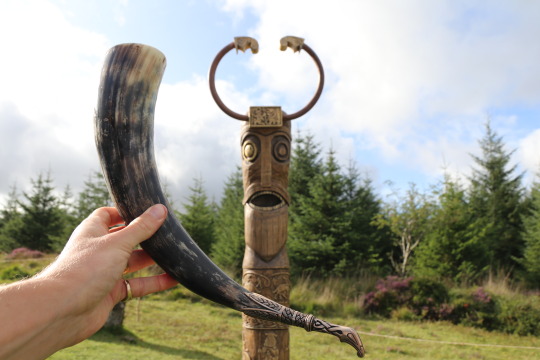
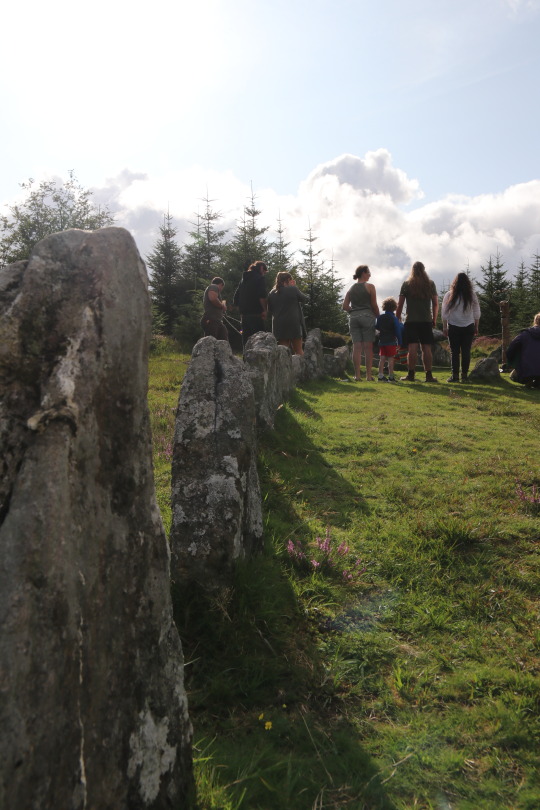
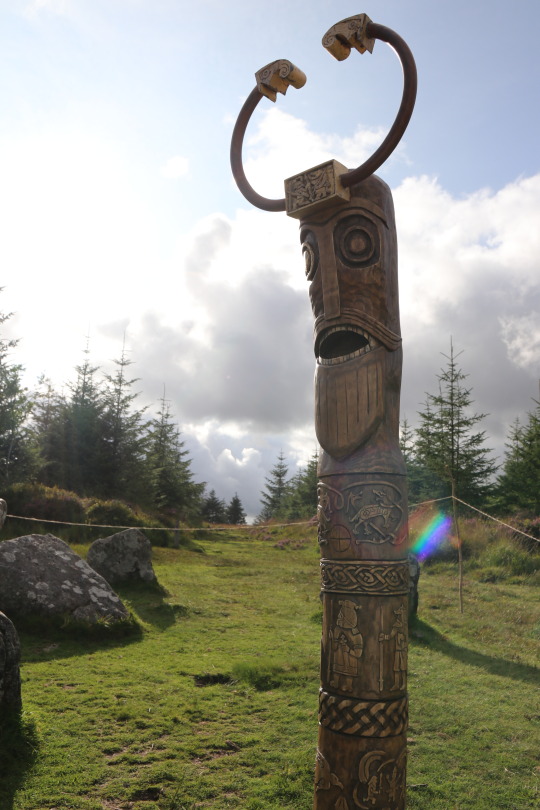

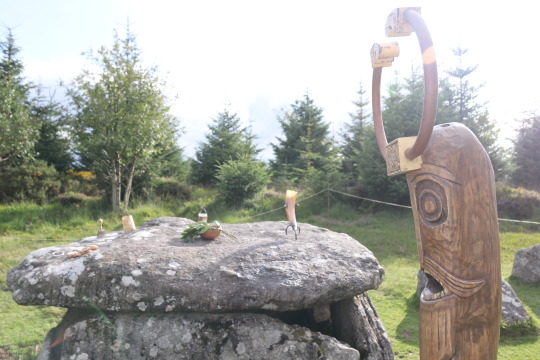

9 adults and 5 children of The Hearth of Devon assembled for a blot to Woden on Dartmoor this weekend. The Neolithic stone row served as a procession path leading to a cist/dolmen which we used as a harrow (ON: hörgr). The ritual area was demarcated by hazel poles and a we-band (ON: vébönd). The hlaut bowl is positioned in the centre of the harrow with a flame to the South, the mead horns to the West, a silver oath ring to the East facing the supplicants at Delling's door, and a Woden stapol on the North side of the harrow.
191 notes
·
View notes
Text
Wanderer of the World
Even when I am distant, wandering amidst the past, mimicking your mind, focused on finding my Truth, you guide me back home. Wanderer, O’ Woden, you hold a place deep in my heart. I feel the beat of your staff on earth, in time with the rhythm in my chest. Your runes are my comfort, your wisdom is my well. No matter how far I stray, O’ Woden, I always wander home.
View On WordPress
#anglo-saxon heathenry#anglo-saxon paganism#anglo-saxon polytheism#devotional poetry#fyrnsidu#heathenry#odin#woden
22 notes
·
View notes
Text

Odin riding Sleipnir, with his wolves Geri and Freki
by Max Koch
#odin#sleipnir#horse#wolves#geri#freki#art#illustration#wotan#woden#germanic mythology#norse mythology#mythology#gods#religion#europe#european#northern europe#max koch#gustav schalk#walhalla#valhalla#religious art#germania#germanic#old norse
753 notes
·
View notes
Text

Everthing Norse & Viking
(Facebook Group)
23 notes
·
View notes
Photo

Victor Grasso, “Woden”, 2015, oil on board. B. 1977, Cape May Court House, NJ, EEUU.
#victor grasso#woden#2015#oil on board#american artist#oil painting#painting#art#black#crows#birds#animals#woman#head#portrait#dark#trees#forest#dark aesthetic#black atmosphere#grey#moon#sky#night#realism#figurative art#contemporary art#american art
16 notes
·
View notes
Text
Hail Odin on Odin‘s Day!
May the Allfather‘s tireless quest be the quest of our own hearts;
May the ceaseless yearning of the Wisdom-seeker consume all other desires;
May the restlessness of the Wanderer stir us ever onwards,
Till the day earth embraces us once more.

#eclectic pagan#celtic pagan#norse pagan#pagan#pagan community#pagan wicca#pagan witch#paganism#pagans of tumblr#writers on tumblr#odin’s day#odin allfather#odin#wodentag#woden#druidry#druidism#druid#heathen#norse heathen#germanic heathen#wisdom
17 notes
·
View notes
Text

#mythology#norse mythology#mythology art#norse mythology art#odin#odin art#odin borrson#odin borrson art#woden art#woden#my artwork#my art
49 notes
·
View notes
Text

I know Wednesday has already passed for me, but I had a STRONG connection with Odin last night. He was coming in strong which led to me researching him more and feeling his grandfatherly energy, which I so honestly crave.
He wanted to show me that he was there and well, I told him the troubles I was having with a relationship. And he was giving me advice I needed to hear in that moment. I am not sharing however since it's private, but it was helpful and comforting to hear.
He has his moments of coming and going, but when he decides to stay for a while, it's quite reassuring.
I appreciate the old man.

#Odin#paganblr#deity#deities#witchblr#paganism#norse pantheon#norse paganism#norse deities#norse gods#norse heathen#norse heathenry#norse pagan#eclectic pagan#woden#Óðinn#upg#firewithin-posts#🔥🖤
19 notes
·
View notes
Text

"Ôs is the well of all speech, wisdoms pillar and comfort of the wisemen, and each earls joy and confidence."
From the anglosaxon rune poem.
#dark photography#artists on tumblr#photo edit#art photography#original phography#germany#black and white photography#bnwphotography#black and white photo blog#black metal#norse paganism#pagan metal#paganism#anglo saxon#anglosaxon pagan#ansuz#ansuz rune#old english#woden#huginn and muninn
7 notes
·
View notes
